OCTOBER 28, 2017 | Pastor Zachary Pudlo
Perhaps you’ve heard someone say it before…”There are many paths to God.” This is a Pluralist ideal. One of the cries of secular America is the cry to be inclusive to people of all faiths and beliefs. And anyone who claims there is only one path to God, that there is only one true faith, such a person is arrogant and close-minded. Behind these Pluralist ideas there is both good intentions, and at the same time, exclusive rationality. What follows is an examination of both.
Good Intentions
Behind this “many paths, same destination” idea there are good intentions. The intention is to give equality to all people. Every person should have equal value and equal opportunity to get to the destination of heaven. That motivation for equality for everyone is admirable.
As a Christian it would be hard for me to not admit that Christians haven’t always done the best job of being inclusive. Religions in general haven’t been the solution to peace on earth. And while I sometimes shudder to think about ways that I myself have given Christianity a bad name and have failed to show inclusive love to some people, I also don’t want to turn a blind eye towards the immense good that Christianity has caused in the world (more on that later).
So what do we take away from the fact that there has been so much good and so much bad done in the name of Christianity? Before we answer this question, let’s take a look at the exclusivity behind the good intentions of the “many paths, same destination” claim.
Exclusive Rationality
A few of the underlying thoughts behind this “many paths, same destination” claim are actually quite exclusive when investigated. One of the underlying thoughts is that fundamentally all religions teach the same thing. That couldn’t be any further from the truth. Just take the two largest religions in the world as an example. In Islam, Allah only reserves love for those who “do good” (Sura 2:195, 3:134, 148, 5:93). Therefore, if you don’t fight for Allah, you will not be loved by him. In fact, there are groups of people that the Koran says Allah does not love.
In Christianity, God is love (1 John 4:16). Jesus shows love to everyone, including those who don’t “do good”…the prostitute in John 8, the thief on the cross in Luke 23, the crooked tax collector named Zacchaeus in Luke 19.
What’s the point? Christianity is fundamentally different from Islam and every other major religion. How so? In every major religion, the love of God has to be earned through moral conformity. In Christianity, the order is reversed. God loves us even before we conform. Even more, God loves us and died for us before we even showed an ounce of love to him.
That’s only one difference between Christianity and other religions. We could go on to evaluate the differences in many other areas as well including, where we go after death, how we get there, how to show love to others and many more. And if we were to evaluate each of those as well, we would notice not just minor differences, but large-scale fundamental differences. To say that all paths lead to the same God is being very dismissive of the claims of each religion.
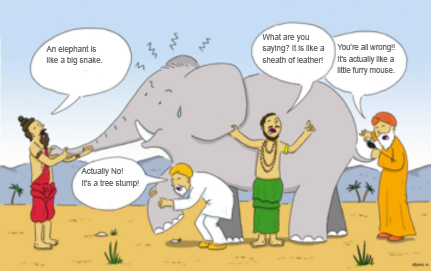 Pluralists also tend to claim that each religion sees only part of reality. The metaphor some Pluralists use to describe the different religions trying to grasp reality is the metaphor of a group of blind men feeling the different parts of an elephant. Each one describes it differently because each one is feeling a different part of the elephant. That’s what many Pluralists will claim about all the different religions. Each religion has only a partial grasp of the entire spiritual picture. The issue with this, however, is that the Pluralist is claiming to have the vision to see the entire picture of spiritual reality.
Pluralists also tend to claim that each religion sees only part of reality. The metaphor some Pluralists use to describe the different religions trying to grasp reality is the metaphor of a group of blind men feeling the different parts of an elephant. Each one describes it differently because each one is feeling a different part of the elephant. That’s what many Pluralists will claim about all the different religions. Each religion has only a partial grasp of the entire spiritual picture. The issue with this, however, is that the Pluralist is claiming to have the vision to see the entire picture of spiritual reality.
On its surface it seems inclusive to say that all paths lead to the same place. But upon further examination, it isn’t respectful of the claims of each individual religion. Furthermore, this claim is extremely exclusive in its claim to have the vision to see all of spiritual reality.
An Inclusive Alternative
There are many things that make Christianity unique when compared to other religions, but one difference that seems to significantly stand out is its inclusivity. On its surface it seems exclusive. Jesus himself stated, “I am the way and the truth and the life.” (John 14:6) Many have certainly noted how exclusive sounding that is. Oprah Winfrey has said on multiple occasions, “Jesus can’t be the only way.” While on the surface Christianity may seem exclusive, a further investigation points in the opposite direction. We will see how Christianity is inclusive not only from an historical perspective, but also from a Biblical perspective.
Historically, one could point to the fact that Christianity has been the most inclusive of all religions. Christianity has done more for civil rights than all the other religions combined. Consider how the early Christian church is responsible for the change in how women were viewed. In Roman times women were little more than property. But one of the main teachings of Christianity is the teaching that God has made each person unique and for a purpose. Historically, Christianity has done more for women’s rights than the feminist movement ever has.
Christianity is also responsible for some of the greatest acts of selfless love recorded in history. Julian the Apostate complained that the Christian Church kept growing because of its care for the poor. He writes, “…it is disgraceful when no Jew is a beggar and the impious Galileans support our poor in addition to their own, that ours are seen to be in want of aid from us… Do not, therefore, let us allow others to outvie us in good deeds, while we ourselves are disgraced by sloth.” The Christians were giving so much support to the poor of every tribe and culture that the Romans looked to be slothful in comparison to them.
It is maybe even more notable to consider the care of Christians for the sick. During the plagues of the first few centuries, Christians were the ones to step up and care for those who had no one to care for them. Bishop Dionysius recorded,
“Most of our brother Christians showed unbounded love and loyalty, never sparing themselves and thinking only of one another. Heedless of danger, they took charge of the sick, attending to their every need and ministering to them in Christ, and with them departed this life serenely happy; for they were infected by others with the disease, drawing on themselves the sickness of their neighbors and cheerfully accepting their pains. Many, in nursing and curing others, transferred their death to themselves and died in their stead.”
Many Christians were so willing to care for the sick and dying that they themselves became infected with the plagues and died. Finally, it was the Christian truths that influenced some of the more recent acts of inclusivity. Just consider the Christian influence behind the abolition of slavery, the civil rights movement, or even more recently, the Ebola Fighters being named Time Magazine’s 2014 Person of the Year.
Historically, Christianity has been the most inclusive religion in history, showing no favoritism based on age, race or gender and even risking security for the well-being of others. The reason for this inclusivity has its roots in the Bible. The reader could just look back to earlier in this post where Jesus shows love and forgiveness to the prostitute, the thief and the crooked tax collector, but there is much more inclusivity than just that small sample size. Galatians 3:28 sums it up nicely, “There is neither Jew nor Greek, slave nor free, male nor female, for you are all one in Christ Jesus.” The first part of one of the most famous passages in all of the Bible illustrates this same point as well, John 3:16 “For God so loved the world that he gave his one and only Son that whoever believes in him will not parish but have eternal life.” Notice what it says, “The WORLD”. Not “some of the world, or “the good people” or “the inclusive people”. GOD LOVED THE WORLD.
Conclusion
I would encourage those who think that Christianity is exclusive in its scope and claims to consider the exclusive results of Pluralism. On the surface it seems to be inviting and inclusive, but deep down it excludes the 90% of the world that is religious. That doesn’t seem inclusive and it doesn’t seem fair. The greatest test of whether or not someone is fair and committed to being fair is whether or not they make exceptions for themselves.
Jesus didn’t make an exception for himself. He didn’t exclude himself from suffering or death. He chose to accept what he didn’t deserve. And he did that for all people regardless of their race, gender or socioeconomic standing. He got what we deserved so we can be certain that he won’t exclude anyone based on race, gender, socioeconomic standing or any other arbitrary judgment. There’s nothing more inclusive than that.
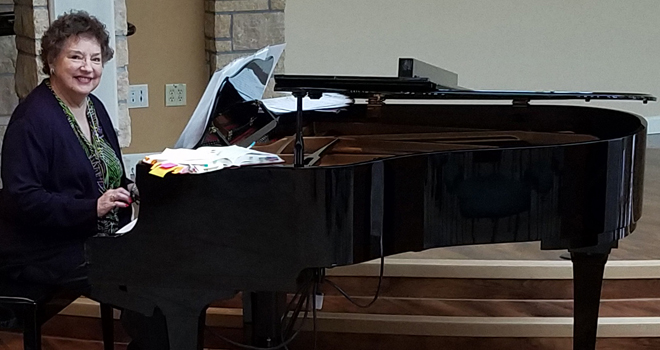
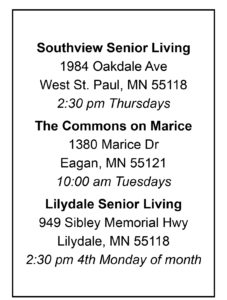 Even though she has moved into The Commons and is retired, Sylvia’s heart for the Lord hasn’t slowed down. A year after she moved into The Commons, she heard they needed a local church to lead a Worship Service. Sylvia knew her pastors would be up for the task, but one hurdle remained…Who would play music for the weekly services? Sylvia thought to herself, “I have had more time to practice the piano since I moved here.” So… that’s exactly what she did. In her own words, “I practiced my little fingers off!” Now she plays piano for the weekly Tuesday service at The Commons and our three pastors from Crown of Life rotate leading the services. But that’s not all she does. She also volunteers and leads a Sunday afternoon Hymn Sing and Bible Story up on 4th floor in Memory Care at The Commons. “It’s probably the happiest hour of my week! I absolutely love these folks! In addition, I am currently playing piano and leading a 6 week Christmas Carol Sing-along on Thursday afternoons for The Commons residents. The group is really growing each week.”
Even though she has moved into The Commons and is retired, Sylvia’s heart for the Lord hasn’t slowed down. A year after she moved into The Commons, she heard they needed a local church to lead a Worship Service. Sylvia knew her pastors would be up for the task, but one hurdle remained…Who would play music for the weekly services? Sylvia thought to herself, “I have had more time to practice the piano since I moved here.” So… that’s exactly what she did. In her own words, “I practiced my little fingers off!” Now she plays piano for the weekly Tuesday service at The Commons and our three pastors from Crown of Life rotate leading the services. But that’s not all she does. She also volunteers and leads a Sunday afternoon Hymn Sing and Bible Story up on 4th floor in Memory Care at The Commons. “It’s probably the happiest hour of my week! I absolutely love these folks! In addition, I am currently playing piano and leading a 6 week Christmas Carol Sing-along on Thursday afternoons for The Commons residents. The group is really growing each week.”
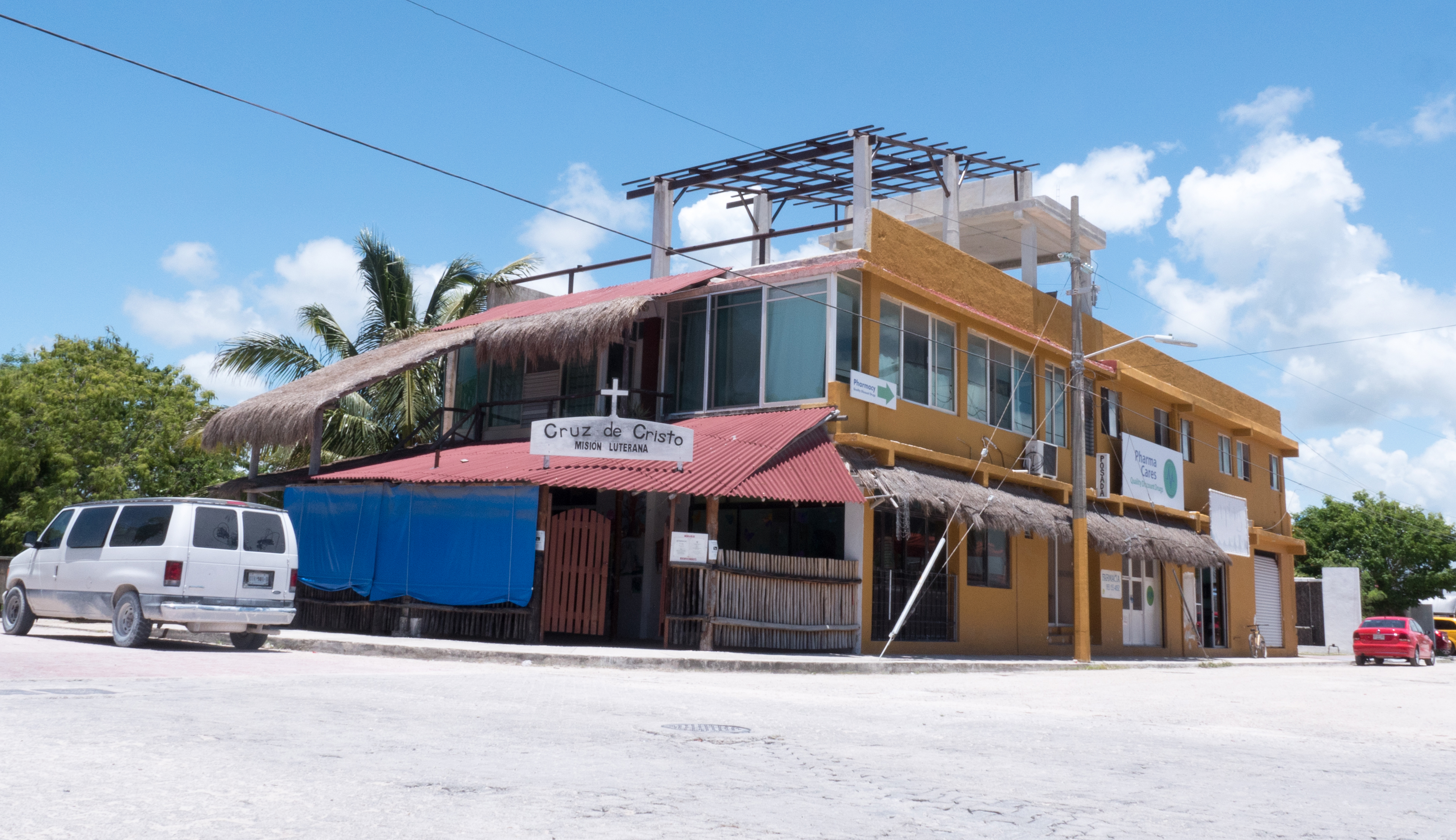
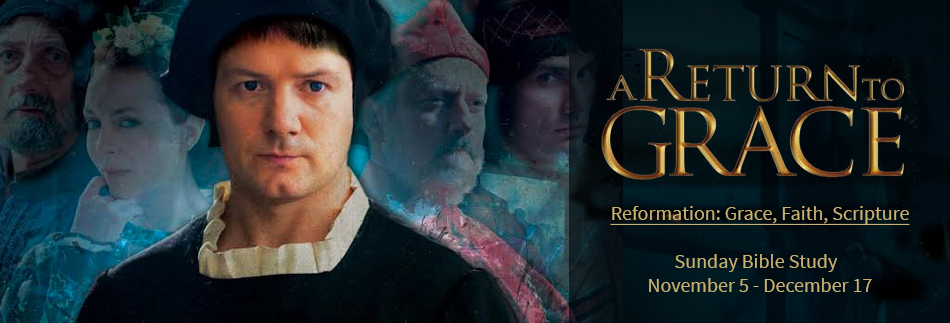
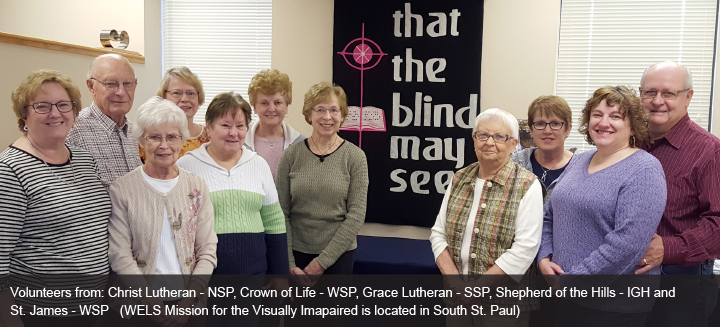
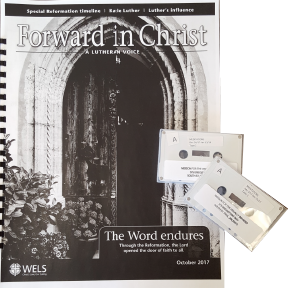 This team effort begins with pastors recording, staff coordinating, translating, duplicating, address and mailing cassettes. If a braille translation is requested, one volunteer (visually impaired) is dictated the material, types the translation into a computer which is then sent to a special printer that prints in braille. The stack of
This team effort begins with pastors recording, staff coordinating, translating, duplicating, address and mailing cassettes. If a braille translation is requested, one volunteer (visually impaired) is dictated the material, types the translation into a computer which is then sent to a special printer that prints in braille. The stack of 
 Pluralists also tend to claim that each religion sees only part of reality. The metaphor some Pluralists use to describe the different religions trying to grasp reality is the metaphor of a group of blind men feeling the different parts of an elephant. Each one describes it differently because each one is feeling a different part of the elephant. That’s what many Pluralists will claim about all the different religions. Each religion has only a partial grasp of the entire spiritual picture. The issue with this, however, is that the Pluralist is claiming to have the vision to see the entire picture of spiritual reality.
Pluralists also tend to claim that each religion sees only part of reality. The metaphor some Pluralists use to describe the different religions trying to grasp reality is the metaphor of a group of blind men feeling the different parts of an elephant. Each one describes it differently because each one is feeling a different part of the elephant. That’s what many Pluralists will claim about all the different religions. Each religion has only a partial grasp of the entire spiritual picture. The issue with this, however, is that the Pluralist is claiming to have the vision to see the entire picture of spiritual reality.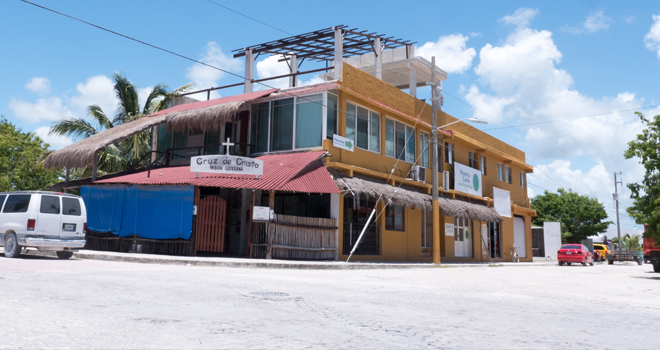
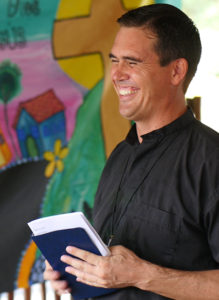
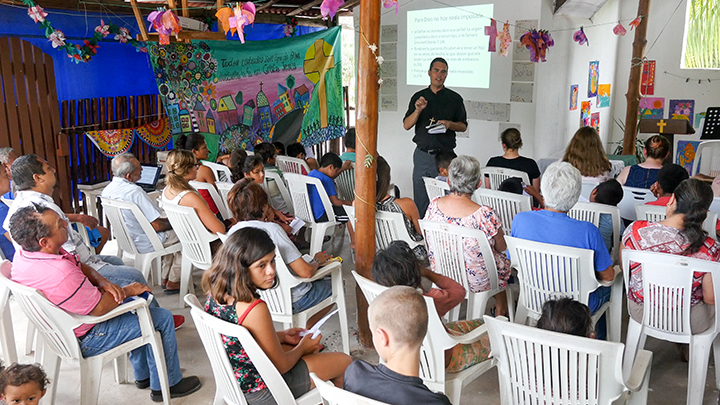
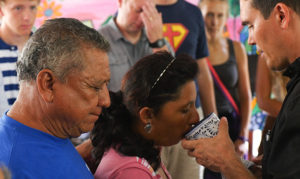 A great deal of my time in Mahahual was spent interviewing members of the church, many in their native Spanish. Working with Pastor to translate my questions, we asked them to share their story of faith. While I have some understanding of Spanish, I’m far from fluent. However, their physical responses bridged the language barrier in a way that mere words could not. Unbridled joy shown on their faces and through their body language as they spoke about the power of the Gospel coming into their lives. As someone blessed to be raised in a Christian household from birth, “hearing” this testimony was rare, raw and inspiring.
A great deal of my time in Mahahual was spent interviewing members of the church, many in their native Spanish. Working with Pastor to translate my questions, we asked them to share their story of faith. While I have some understanding of Spanish, I’m far from fluent. However, their physical responses bridged the language barrier in a way that mere words could not. Unbridled joy shown on their faces and through their body language as they spoke about the power of the Gospel coming into their lives. As someone blessed to be raised in a Christian household from birth, “hearing” this testimony was rare, raw and inspiring.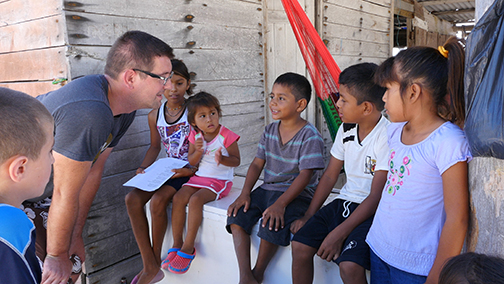 Sunday morning comes and Iglesia Cruz de Cristo is abuzz with activity. Children set up chairs. Volunteers from the States make new acquaintances. Kids pour in from the vans outside. The service begins and songs of praise echo into “Casitas” or “little houses” neighborhood where the church resides. Yallo, a man with a weathered face and eyes of deep compassion, stands to read a scripture lesson, sharing the Word with his fellow Mexicans. This is critical. The mission, built by the tireless efforts of Jerry Zimpelmann and countless volunteers, now needs the people it serves to take ownership, to make it their church, to spread the joy they’ve found whenever they go. Watching Yallo as he read, face beaming with pride, there is no doubt strong roots are taking hold.
Sunday morning comes and Iglesia Cruz de Cristo is abuzz with activity. Children set up chairs. Volunteers from the States make new acquaintances. Kids pour in from the vans outside. The service begins and songs of praise echo into “Casitas” or “little houses” neighborhood where the church resides. Yallo, a man with a weathered face and eyes of deep compassion, stands to read a scripture lesson, sharing the Word with his fellow Mexicans. This is critical. The mission, built by the tireless efforts of Jerry Zimpelmann and countless volunteers, now needs the people it serves to take ownership, to make it their church, to spread the joy they’ve found whenever they go. Watching Yallo as he read, face beaming with pride, there is no doubt strong roots are taking hold.

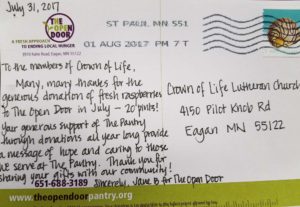 Every year Darrell spends countless hours cultivating this massive garden. Why? It’s a passion. “Gardening for me is a good form of exercise. It brings me back to the basics of planting seeds and taking care of the new plants. Each seed or plant is like a little miracle.” The produce also gets put to good use. Darrell says, “A good amount of the garden produce is given to the food shelf in Crown of Life’s name. Of course, family, friends and neighbors also get to enjoy the blessings of the garden.” Darrell has made a name for himself at The Open Door, a food shelf dedicated to offering healthy food options to those in need. Several times/year The Open Door sends a thank you card to the members of Crown of Life for the donations of fresh produce.
Every year Darrell spends countless hours cultivating this massive garden. Why? It’s a passion. “Gardening for me is a good form of exercise. It brings me back to the basics of planting seeds and taking care of the new plants. Each seed or plant is like a little miracle.” The produce also gets put to good use. Darrell says, “A good amount of the garden produce is given to the food shelf in Crown of Life’s name. Of course, family, friends and neighbors also get to enjoy the blessings of the garden.” Darrell has made a name for himself at The Open Door, a food shelf dedicated to offering healthy food options to those in need. Several times/year The Open Door sends a thank you card to the members of Crown of Life for the donations of fresh produce.
